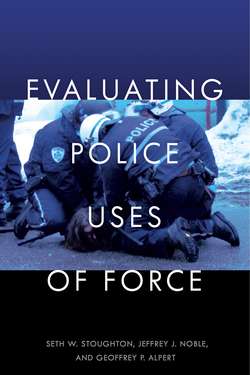Читать книгу Evaluating Police Uses of Force - Seth W. Stoughton - Страница 15
На сайте Литреса книга снята с продажи.
Criminal Prosecutions under 18 U.S.C. §§ 241, 242, and 245
ОглавлениеIndividual police officers can be prosecuted for violating the Fourth Amendment, although not every constitutional violation is inherently criminal. Although federal civil claims may be brought in federal or state court, a statute, 18 U.S.C. § 3231, establishes that federal courts are the exclusive forum for federal criminal prosecutions. Section 3231 states that federal courts “have original jurisdiction, exclusive of the courts of the States, of all offenses against the laws of the United States [that is, federal laws].” One of those laws of the United States, 18 U.S.C. § 42, is a criminal analogue to § 1983. It states:
Whoever, under color of any law, statute, ordinance, regulation, or custom, wilfully subjects any person in any State, Territory, Commonwealth, Possession, or District to the deprivation of any rights, privileges, or immunities secured or protected by the Constitution or laws of the United States . . . shall be fined under this title or imprisoned not more than one year, or both; and if bodily injury results from the acts committed in violation of this section or if such acts include the use, attempted use, or threatened use of a dangerous weapon, explosives, or fire, shall be fined under this title or imprisoned not more than ten years, or both; and if death results from the acts committed in violation of this section or if such acts include kidnapping or an attempt to kidnap, aggravated sexual abuse, or an attempt to commit aggravated sexual abuse, or an attempt to kill, shall be fined under this title, or imprisoned for any term of years or for life, or both, or may be sentenced to death.
Both 18 U.S.C. § 242 and 42 U.S.C. § 1983, discussed above, have given rise to a substantial body of law and academic literature that we will not address in depth here. For our purposes, it is sufficient to know that the statute applies when (1) officers acting “under color of . . . law” (2) willfully (3) commit a constitutional violation.
With regard to the first prong, the Supreme Court has concluded that officers act under color of law when “clothed with the authority” of the state, even if the officer’s actions are specifically prohibited by state law.10 Thus, an officer who blatantly misuses the power they possess by virtue of their position can be liable under this statute because their actions were made possible by virtue of their state-granted authority.
The second prong—“wilfully”—relates to the officer’s mental state, what criminal law calls mens rea (literally, “guilty mind”). Unfortunately, as legal scholar David Sklansky writes,
[e]xactly what that means has never been clear. It doesn’t mean that the officer had to be thinking about the Constitution, but it is not enough that the officer intentionally did something that a judge or jury later decides was unconstitutional. At a minimum, federal case law suggests that the officer must have acted in “open defiance or reckless disregard” of a clearly articulated constitutional prohibition. And even that may not be enough. Most federal courts require proof that the officer acted with a “bad purpose or evil motive,” by which they mean some kind of an intention to deprive the victim of a constitutional right.11
On the one hand, an officer who uses force sadistically to punish a community member in the clear absence of legal authority easily satisfies the criminal standard. On the other hand, an officer who uses force in the good-faith but mistaken belief that force is appropriate is highly unlikely to have the requisite mens rea.
The third prong is the easiest to address in light of the earlier discussion of constitutionality: if the officer’s actions were constitutional, then 18 U.S.C. § 242 is inapplicable. That is, without a constitutional violation, there can be no crime.
In addition, there are a range of other crimes in which the Fourth Amendment can play some predicate role. 18 U.S.C. § 924(c)(1)(A) criminalizes carrying, using, brandishing, or discharging a firearm using the commission of an act that is punishable by federal law as a crime of violence. Certain violations of 18 U.S.C. § 242—those in which “bodily injury results from the acts committed”—can constitute a crime of violence, which means that an officer may be criminally charged both for willfully violating someone’s constitutional rights and for carrying or using a firearm while doing so.12 If, on the other hand, the officer’s actions did not constitute a Fourth Amendment violation, then there is no willful violation, which means there is no crime of violence, which means that the officer’s carrying or use of the firearm is not a crime under federal law. The constitutionality of police actions may also be relevant in a more attenuated way; 18 U.S.C. § 241 criminalizes conspiracies—that is, agreements between two or more persons to “injure, oppress, threaten, or intimidate any person . . . in the free exercise or enjoyment of any right or privilege secured to him by the Constitution,” which includes the Fourth Amendment right to be free from unreasonable seizures.
Thus, the constitutional standard applies in at least three different ways: in civil litigation filed by a private plaintiff (or a class of plaintiffs) against an officer or agency; in civil litigation filed by the Department of Justice against an agency; and in federal criminal prosecutions against officers.
